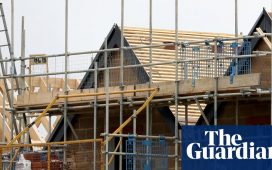Stay informed with free updates
Simply sign up to the UK property myFT Digest — delivered directly to your inbox.
Rental affordability in the UK is at its worst in more than seven years, with tenants spending close to 30 per cent of their incomes on housing, according to new data.
Rent on new tenancies cost 28.8 per cent of renters’ gross income in July, according to figures from property data company PriceHubble published by the Office for National Statistics this week.
The statistics agency defines rent as “unaffordable” if it accounts for more than 30 per cent of income. Rent as a share of wages has risen by 2.2 percentage points over the past year to the highest since at least 2017, as far back as the data extend.
“This is proof if you need it that we have a problem with affordability in the UK,” said Sandra Jones, managing director at PriceHubble, which gathers data from the financial checks that landlords run on new tenants.
Worsening affordability will add to the pressure on the Labour government to tackle the crisis in the UK rental market, which is suffering from a lack of supply and record rent increases.
Average UK private rents rose by 8.6 per cent in the 12 months to July, the ONS said this week, unchanged from June and still close to a record 9.2 per cent annual increase in March.

“Rents continue to outstrip pay growth,” said Robert Wood, economist at consultancy Pantheon Macroeconomics.
Wage growth slowed to a near two-year low of 5.4 per cent in the three months to June, the ONS said on Tuesday.
Rental affordability will be considerably worse for people on lower incomes and in some parts of the country. Rent accounted for 31.7 per cent of incomes in London in July, according to the data.
Jones cited “a number of explanations” for the pressure in the rental market, including regulatory changes, landlords selling their properties and more people wanting a spare bedroom to work from home.
Despite the affordability squeeze, she said institutional investors were still “keen to deliver rental housing at scale, for all segments of the market”.
In part to avoid scaring off investment in new homes, the government has ruled out imposing rent controls to ease the crisis.
The Ministry of Housing, Communities and Local Government said: “This government has no plans whatsoever to devolve rent control powers . . . Lack of supply is fuelling the housing crisis.”
The administration has pledged to boost home building, and to impose regulation to prevent bidding wars, end “unreasonable” rent rises for sitting tenants and stop Section 21 “no fault evictions” — a measure promised by the last Conservative government.
Sadiq Khan, Labour mayor of London, has repeatedly called on the government to give him powers to impose rent controls in the capital, where rent has already breached the official affordability threshold.
A paper published this week by the Institute of Economic Affairs, the free-market think-tank, argued that the negative consequences of rent control outweigh the benefits to tenants.
“The finding that rent controls reduce the supply and quality of rental housing, reduce housing construction, reduce mobility among private tenants, and lead to a misallocation of the existing rental housing stock, is as close to a consensus as economic research can realistically get,” said Kristian Niemietz, IEA editorial director.
Ben Twomey, chief executive of campaign group Generation Rent, said “a fair and common sense approach” would “stop rents rising faster than our wages or inflation”.










